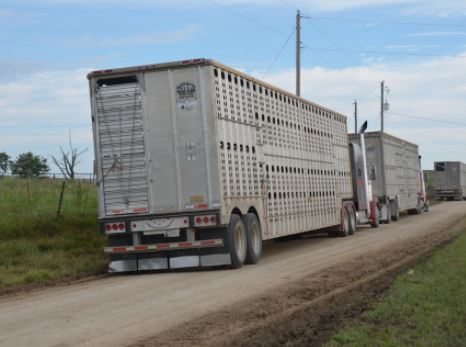
Regulation Changes Bring New Training Requirements for Livestock Transporters
By Janelle Smith, Livestock and Feed Extension Specialist, Tisdale Regional Office
In 1977, the federal government released the ‘Health of Animals Regulations: Transport of Animals’ to update standards on the welfare of animals in transport. Participants in the amendment process included researchers and veterinarians as well as legal, government, and animal advocacy stakeholders.
The updated regulations were published in 2016, and enforcement of these changes began in February 2020. The Canadian Food Inspection Agency is implementing a two-year gradual enforcement period involving education, promotion and outcome-based requirements as opposed to penalties for industry. Failure to comply with the new regulations will result in penalties beginning in February 2022.
Some of the most notable amendments include:
- The addition of feed, water and rest (FWR) intervals and changes to overall transport times;
- New definitions and clearer language with outcome-based requirements;
- Updated vulnerable and compromised animal considerations; and
- Innovation options for fully equipped conveyances.
Previous regulations focused on confinement time or the period animals are loaded and subsequently unloaded from transport. The new amendments focus on the FWR interval instead of the total period that animals have been restricted. This interval accounts for the total time that animals are taken off feed and water to the time they arrive at a destination that provides FWR. This FWR interval cannot exceed 12 hours for vulnerable animals, 28 hours for porcine/equine and 36 hours for ruminants. The outcome-based measure that will be enforced ensures animals get rest that prevents suffering, dehydration and exhaustion. If animals must be unloaded at a rest facility, the rest time must be at least eight hours, where it was five hours previously. Additionally, young ruminants eight days of age or less cannot be more than 12 hours without FWR, where previous regulations stipulated a maximum of 18 hours confinement time (see Related Links below for more information).
With these changes, new training is a compliance requirement for commercial transporters. The Canadian Livestock Transport (CLT) Certification Program was recently released by the National Farmed Animal Health and Welfare Council in Canada. The training is provided online and is accessible from a computer or a smartphone. There are two training streams: poultry or livestock (including cattle, sheep, hogs, bison and elk). Each stream provides instruction and best management practices for the welfare and safe handling of animals. The CLT Certification Program focuses on key topics over six modules and graduates will be certified for humane handling throughout Canada and the United States.
Animal welfare is an important factor in animal agriculture from both a public trust, trade and production standpoint. Commercial transporters, as well as other industry members including loading crews, animal catchers, producers and regulators need to stay informed on training and regulatory compliance changes.
If you have any further questions regarding the changes, please contact the Agriculture Knowledge Centre at 1-866-457-2377.
For the latest information and for more updates on everything Kindersley ‘Like’ the Kindersley Social Facebook page below…








































